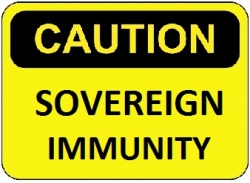"Sovereign immunity"
 | |
| Type | legal |
| The legal doctrine, applicable in many countries of the world, that national governments and government officials are effectively 'above the law', i.e. cannot be tried. | |
"Sovereign immunity" (or, in the case of monarchies, "crown immunity"), is - like "royal prerogative" - a legal doctrine by which the sovereign or state cannot commit a legal wrong and is immune from civil suit or criminal prosecution. This can be thought of as a second, older, line of defence for avoiding prosecution; if in spite of hiding information under a pretext of national security, significant evidence of wrongdoing emerges, this doctrine could be used to try to justify prevent prosecution of the guilty.
Contents
National law
Because of the doctrine's historical origins, the theory and practice of sovereign immunity is varied around the world - unlike diplomatic immunity, there was never any need to standardise it. In constitutional monarchies the sovereign is the historical origin of the authority which creates the courts. Thus the courts had no power to compel the sovereign to be bound by the courts, as they were created by the sovereign for the protection of his or her subjects.
UK
The Crown Proceedings Act 1947 made the Crown (when acting as the government) liable as of right in proceedings where it was previously only liable by virtue of a grant of a fiat.[1] With limited exceptions, this had the effect of allowing proceedings for tort and contract to be brought against the Crown.[1] Proceedings to bring writs of mandamus and prohibition were always available against ministers, because their actions derive from the royal prerogative.[citation needed] Criminal proceedings are however still prohibited from being brought against the UK government unless expressly permitted by Crown Proceedings Act.[2]
As the Crown Proceedings Act only affected the law in respect of acts carried on by or on behalf of the UK government, the UK monarch remains personally immune (crown immunity) from criminal and civil actions.[3] However, civil proceedings could theoretically still be brought using either of the two original mechanisms outlined above - by petition of right or by suit against the Attorney-General for a declaration.[4]
US
In Hans v. Louisiana (1890), the Supreme Court of the United States held that the Eleventh Amendment (1795) re-affirms that states possess sovereign immunity and are therefore generally immune from being sued in federal court. In recent years, the Supreme Court has strengthened state sovereign immunity considerably. In Blatchford v. Native Village of Noatak (1991), the court explained that
we have understood the Eleventh Amendment to stand not so much for what it says, but for the presupposition of our constitutional structure which it confirms: that the States entered the federal system with their sovereignty intact, that the judicial authority in Article III is limited by this sovereignty, and that a State will therefore not be subject to suit in federal court unless it has consented to suit, either expressly or in the "plan of the convention." [Citations omitted.]
In Alden v. Maine (1999), the Court clarified that while it has
sometimes referred to the States’ immunity from suit as "Eleventh Amendment immunity[,]" [that] phrase is [a] convenient shorthand but something of a misnomer, [because] the sovereign immunity of the States neither derives from nor is limited by the terms of the Eleventh Amendment. Rather, as the Constitution's structure, and its history, and the authoritative interpretations by this Court make clear, the States’ immunity from suit is a fundamental aspect of the sovereignty which the States enjoyed before the ratification of the Constitution, and which they retain today (either literally or by virtue of their admission into the Union upon an equal footing with the other States) except as altered by the plan of the Convention or certain constitutional Amendments.
However, if a defendant can demonstrate that the government's action was done in bad faith, they can receive damages despite sovereign immunity.
International law
Sovereign immunity is available to countries in international court. But if they are acting more as a contracting body (example: making agreements with regard to extracting oil and selling it), then sovereign immunity may not be available to them.
Under international law, and subject to some conditions, countries are immune from legal proceedings in another state. This stems from customary international law.[5]
September 11th, 2001
- Full article:
 9-11
9-11
- Full article:
In September 2015, George B. Daniels, a US Judge ruled that Saudi Arabia had sovereign immunity from prosecution for the 9-11 attacks. Trial judges had already twice before ruled that Saudi Arabia was entitled to immunity under the federal Foreign Sovereign Immunities Act, but in 2013, the 2nd U.S. Circuit Court of Appeals in New York revived the lawsuit, in light of a 2011 decision that had allowed similar claims to proceed against Afghanistan.[6] Daniels later ruled that Iran pay $10.5 billion to victims and insurers of the attacks.[7]
Related Document
| Title | Type | Publication date | Author(s) | Description |
|---|---|---|---|---|
| Document:Solidarity with all protesting the imposition of an unelected King | Op-ed | 12 September 2022 | Radical Independence Campaign | The death of Elizabeth II means the automatic appointment, with no discussion or reflection on our future, of a King manifestly unfit to represent the modern peoples of these islands. Charles is unelected, and unelectable. He would never have been chosen in a democratic system. |
References
- ↑ a b Halsbury's Laws of England, volume 8(1): "Constitutional Law and Human Rights", paragraph 382
- ↑ Sunkin, Maurice (2003). "Crown immunity from criminal liability in English law". Public Law (Winter 2003): 716–729.
- ↑ Halsbury's Laws of England, volume 12(1): "Crown and Royal Family", paragraph 47
- ↑ Halsbury's Laws of England, volume 12(1): "Crown and Royal Family", paragraph 56
- ↑ Akehurst's modern introduction to international law, by Peter Malanczuk, Michael Barton Akehurst, Routledge 7 ed., 1997, ISBN 0-415-11120-X, Page 118
- ↑ http://www.reuters.com/article/2015/09/30/us-usa-sept11-saudi-idUSKCN0RT2ZP20150930
- ↑ http://www.cbsnews.com/news/judge-iran-taliban-al-qaeda-liable-for-9-11/